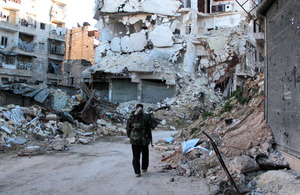Human Rights and Democracy Report 2012 - Libya
Libya continued to make progress towards democracy, and now has its first democratically elected Prime Minister and government in over 40 years.

Aleppo, Karm al Jabal. This neighborhood is next to Al Bab and has been under siege for 6 months, 4 March 2013. Credit: Basma
Human rights in countries of concern - Libya
Libya has continued to make progress towards democracy, with the appointment of the new Prime Minister, Dr Ali Zeidan, elected by the General National Congress (GNC) on 14 October, and the swearing in of a new government on 14 November. Libya now has its first democratically elected Prime Minister and government in over 40 years. However, a number of human rights concerns remain, and the lack of government control of security continues to present a major challenge to the protection of human rights.
The Libyan government has made public commitments to upholding human rights in the new Libya. During an address to the UN General Assembly in September, the President of the GNC, Dr Mohammed Magarief, gave assurances that Libya would respect human rights and its international obligations and highlighted specific measures that it would put in place. The Prime Minister, Dr Ali Zeidan, a former human rights activist who co-founded and served as the spokesperson for the Libyan League for Human Rights from 1989 to 2002, said that the new Libya would be based on “the rule of law, human rights and democracy”.
Security poses the greatest challenge in the immediate future. Libya faces significant difficulties as it seeks to overcome nearly half a century of dictatorship and to integrate former revolutionary fighters into state structures. Some armed groups have been incorporated into state bodies, but many are still operating independently. There have been a number of serious security incidents, most notably the September attack on the US Consulate in Benghazi, which resulted in the deaths of the US Ambassador and other US officials. In June, an attack against the British Ambassador’s convoy in Benghazi led to the decision to suspend the UK Office’s operations in Benghazi. Immediate and vociferous protests by large numbers of Libyans against these attacks, however, is evidence that there is a strong desire to embed respect for human rights, and an effective and accountable security apparatus, in their country.
The judiciary is functioning to a limited extent but there continue to be reports of arbitrary arrest and mistreatment of detainees, particularly in areas outside government control. Other key concerns are women’s and minority rights, freedom of religion or belief and freedom of expression, in particular media freedom.
Our strategy in 2012 focused on supporting the Libyan authorities in establishing central control of the judicial sector (essential to addressing some of the outstanding human rights issues), creating a democratic framework to promote basic freedoms and rights and tackling legacy issues, including establishing a fair process to deal with detainees and former Qadhafi supporters.
The UK continues to work through the EU and the United Nations Support Mission in Libya (UNSMIL) to provide coordinated assistance to the Libyan authorities through the tri-departmental Conflict Pool (FCO/DFID/MOD) and the FCO–DFID Arab Partnership Fund. The past year saw an extensive package of support, including strategic advice on restoring public security and promoting the rule of law, support to the Judicial Police through a prison reform project, the provision of forensics equipment and training for the Judicial Police, a substantial contribution to the UN elections fund and training of domestic electoral observers, focusing on women and youth groups. These projects increased the participation of citizens in the democratic process and election-monitoring training programmes. We are exploring what additional support we can provide in 2013.
Further information
Read and comment on Human rights in countries of concern - Libya in English
Read and comment on the Human Rights and Democracy Report 2012 in full in English